Previous Session Recap
Trading volume at PSX floor increased by 46.12 million shares or 46.70% on DoD basis, whereas the benchmark KSE100 index opened at 28,564.83, posted a day high of 28,787.60 and a day low of 27,169.14 points during last trading session while session suspended at 27,228.80 points with net change of -1336.03 points and net trading volume of 123.67 million shares. Daily trading volume of KSE100 listed companies also increased by 43.49 million shares or 54.23% on DoD basis.
Foreign Investors remained in net selling positions of 8.72 million shares and value of Foreign Inflow dropped by 4.90 million US Dollars. Categorically, Foreign Individuals and Corporate remained in net selling positions of 0.07 and 9.41 million shares respectively but Overseas Pakistani remained in net long positions of 0.76 million shares respectively. While on the other side Local Individuals Companies, Banks, NBFCs, Brokers and Insurance Companies remained in net long positions of 1.79, 2.82, 8.71. 0.14, 0.78 and 5.49 million shares but Mutual Fund remained in net selling positions of 7.75 million shares respectively.
Analytical Review
Stocks run out of steam on U.S. job jitters, yen gains
A two-day equities rally lost momentum on Thursday, and investors sold riskier currencies, as stimulus negotiations dragged on in Washington and investors fretted over a likely spike in U.S. jobless claims. MSCI’s broadest index of Asia-Pacific shares outside Japan wobbled either side of flat. Japan’s Nikkei slumped 4% and U.S. stock futures fell 1%. The dollar climbed around 1% against the Australian and New Zealand dollars and the yen rose 0.4% against the dollar as investors sought shelter. “We are not out of the woods just yet,” said Stephen Daghlian, at brokerage CommSec in Sydney. “There are plenty of risks in the next couple of weeks.”
Rs7.8bn approved for NDMA to contain pandemic
The National Disaster Risk Management Fund (NDRMF) on Wednesday approved Rs7.89 billion for the National Disaster Management Authority (NDMA) to supplement the government’s efforts for prevention and spread of Covid-19 outbreak in the country. In the wake of declaration of Coronavirus Disease 2019 (Covid-19) a pandemic by the World Health Organisation, the federal government declared a National Health Emergency of Public Concern on March 13. As the number of confirmed cases of coronavirus is growing on a daily basis in the country, the situation warranted the top-level preparedness and preemptive measures to control the deadly disease in the country.
Govt to get $4bn from lending, aid agencies
Pakistan has arranged about $4 billion additional financial assistance from multilateral lending and aid agencies to shore up foreign exchange reserves and budgetary support for fighting adverse impacts of the coronavirus pandemic. “We have made progress in mobilisation of additional funds,” said Adviser to the Prime Minister on Finance and Revenue Dr Abdul Hafeez Shaikh, adding that discussions with the International Monetary Fund (IMF) were in progress for $1.4bn additional funds for fast track disbursements on same terms as the ongoing fund programme.
Oil and gas declared essential services amid lockdown
The government on Wednesday notified oil, gas and related operations as ‘Essential Services” to avoid any disruption due to the prevailing lockdowns in some provinces. It also notified Rs15 per litre reduction in prices of petrol, diesel and kerosene in line with the announcement made by the prime minister but rejected calls by oil marketing companies and retailers for compensation against inventory losses. Petroleum Assistant Nadeem Babar said the operations of some sectors in the oil and gas, including LNG port handling, had come under pressure because of provincial lockdowns and special intervention had to be made to ease the situation. Separately, in a notification issued by the Petroleum Division said the supply of oil and gas and related operations were essential services to meet energy requirements of the country. Hence, the movement of all E&P companies operating in Pakistan, their subcontractors, personnel, equipment and vehicles was essential to keep the services up and running.
SBP relaxes forex rules for medical goods import
The State Bank of Pakistan has revised foreign exchange regulations to facilitate import of medical equipment and medicine. In a press release issued on Wednesday, the SBP “allowed all federal and provincial government departments, hospitals in public and privates sectors, charitable organisations, manufacturers and commercial importers to make import advance payment and import on open account, without any limit, for the import of medical equipments, medicines, and other ancillary items for the treatment of COVID-19.” Further the banks have been allowed to approve Electronic Import Form (EIF) for the import of the equipment donated by international donor agencies and foreign governments to facilitate their seamless and speedy purchase.
A two-day equities rally lost momentum on Thursday, and investors sold riskier currencies, as stimulus negotiations dragged on in Washington and investors fretted over a likely spike in U.S. jobless claims. MSCI’s broadest index of Asia-Pacific shares outside Japan wobbled either side of flat. Japan’s Nikkei slumped 4% and U.S. stock futures fell 1%. The dollar climbed around 1% against the Australian and New Zealand dollars and the yen rose 0.4% against the dollar as investors sought shelter. “We are not out of the woods just yet,” said Stephen Daghlian, at brokerage CommSec in Sydney. “There are plenty of risks in the next couple of weeks.”
The National Disaster Risk Management Fund (NDRMF) on Wednesday approved Rs7.89 billion for the National Disaster Management Authority (NDMA) to supplement the government’s efforts for prevention and spread of Covid-19 outbreak in the country. In the wake of declaration of Coronavirus Disease 2019 (Covid-19) a pandemic by the World Health Organisation, the federal government declared a National Health Emergency of Public Concern on March 13. As the number of confirmed cases of coronavirus is growing on a daily basis in the country, the situation warranted the top-level preparedness and preemptive measures to control the deadly disease in the country.
Pakistan has arranged about $4 billion additional financial assistance from multilateral lending and aid agencies to shore up foreign exchange reserves and budgetary support for fighting adverse impacts of the coronavirus pandemic. “We have made progress in mobilisation of additional funds,” said Adviser to the Prime Minister on Finance and Revenue Dr Abdul Hafeez Shaikh, adding that discussions with the International Monetary Fund (IMF) were in progress for $1.4bn additional funds for fast track disbursements on same terms as the ongoing fund programme.
The government on Wednesday notified oil, gas and related operations as ‘Essential Services” to avoid any disruption due to the prevailing lockdowns in some provinces. It also notified Rs15 per litre reduction in prices of petrol, diesel and kerosene in line with the announcement made by the prime minister but rejected calls by oil marketing companies and retailers for compensation against inventory losses. Petroleum Assistant Nadeem Babar said the operations of some sectors in the oil and gas, including LNG port handling, had come under pressure because of provincial lockdowns and special intervention had to be made to ease the situation. Separately, in a notification issued by the Petroleum Division said the supply of oil and gas and related operations were essential services to meet energy requirements of the country. Hence, the movement of all E&P companies operating in Pakistan, their subcontractors, personnel, equipment and vehicles was essential to keep the services up and running.
The State Bank of Pakistan has revised foreign exchange regulations to facilitate import of medical equipment and medicine. In a press release issued on Wednesday, the SBP “allowed all federal and provincial government departments, hospitals in public and privates sectors, charitable organisations, manufacturers and commercial importers to make import advance payment and import on open account, without any limit, for the import of medical equipments, medicines, and other ancillary items for the treatment of COVID-19.” Further the banks have been allowed to approve Electronic Import Form (EIF) for the import of the equipment donated by international donor agencies and foreign governments to facilitate their seamless and speedy purchase.
Market is expected to remain volatile during current trading session.
Technical Analysis
The Benchmark KSE100 index would try to find some ground at 26,800 points where crossover of a horizontal supportive region is taking place with an ascending trend line, it's expected that index would try to start a reversal after a dip during current trading session to normalize its weekly momentum indicators. Meanwhile it's going to complete 100% expansion of its weekly and monthly bearish correction at 25,450 points and that region would react as a strong supportive region therefore it's recommended to start profit taking in existing long positions and buying on dip for next two to three trading sessions could be beneficial because index would try to recover slightly before monthly closing. It's expected that index would try to recover towards 29,500 and 30,000 points in coming days.
 To Open picture in original resolution right click image and then click open image in a new tab
To Open picture in original resolution right click image and then click open image in a new tab


0 Comments
No comments yet. Be the first to comment!
Please log in to leave a comment.